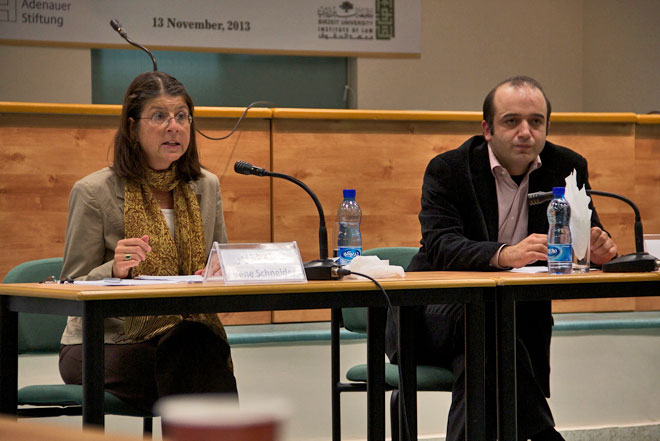Lecture Examines International Law and the Rights of Women in Iran
On November 13, 2013, the Institute of Law at Birzeit University organized a legal encounter on “The Discourse about the Convention on the Elimination of Discrimination Against Women (CEDAW) in the Islamic Republic of Iran: Voices of Female Jurists.” The presentation was made by Irene Schneider, Professor for Arabic Studies and Islamic Law at the University of Göttingen, Germany.
In his opening statement, Institute Director Jamil Salem introduced Professor Schneider. Currently, she is a member of the Senate, Göttingen. Her main fields of research are Islamic law, especially family law and public law, early Islamic history, gender, etc.
Professor Schneider first introduced the 1979 CEDAW. Article (1) of the convention defines discrimination against women as “any distinction, exclusion or restriction made on the basis of sex which has the effect or purpose of impairing or nullifying the recognition, enjoyment or exercise by women, irrespective of their marital status, on a basis of equality of men and women, of human rights and fundamental freedoms in the political, economic, social, cultural, civil or any other field.”
According to Professor Schneider, states ratifying international conventions, including the CEDAW, are required to enshrine gender equality into their national legislation. In the process of developing national legislation, the question arises: How are the articles of these conventions, here specifically CEDAW, turned into national law? How is, for example, the term of "gender equality" understood and interpreted?
In the context of Iran’s experience, Professor Schneider analyzed certain key words, such as feminism, Islamic jurisprudence (Fiqh) and the use of terminologies, including gender equality. She mainly focused on the related concept of “gender equality” in an attempt to understand which gender roles and gender concepts - and gender hierarchies - are connected with it.
Providing an analysis of some Iranian jurists, Professor Schneider explained why CEDAW is not in effect in Iran. In this context, Mortazā Moṭahhārī, an important and influential Iranian thinker and ideologist who died in 1979, rejects Western criticism of Islam in relation to lack of equality of rights between Muslim men and women, on the grounds that the discourse of gender equality, far from being a universal principle, was a Western product and therefore irrelevant to Islam.
Moṭahhārī advocates for “equality” while explicitly speaking out against “similarity” or “resemblance.” He says that “equality is the equal legal rights of men and women and that no legal privileges are given.” According to Moṭahhārī, it is self-evident that “equality” is part of human nature and that it is to be counted as a human right. He further states that “Islam is not opposed to the equality of the rights of men and women; it is opposed to the similarity of their rights.” For example, he argues that polyandry is against human nature whereas polygymy is accepted by Islam. Professor Schneider argued that Moṭahhārī’s advocacy ran counter to the CEDAW.
In the ensuing discussion, participants highlighted significant campaigns launched by the Iranian feminist movement in order to change laws for the benefit of women. In addition to making clear the difference between sex and gender, discussants advocated development of personal status laws in Palestine. Organized in partnership with the Konrad Adenauer Stiftung - Ramallah Office, the legal encounter brought together interested researchers and representatives of relevant organizations.







